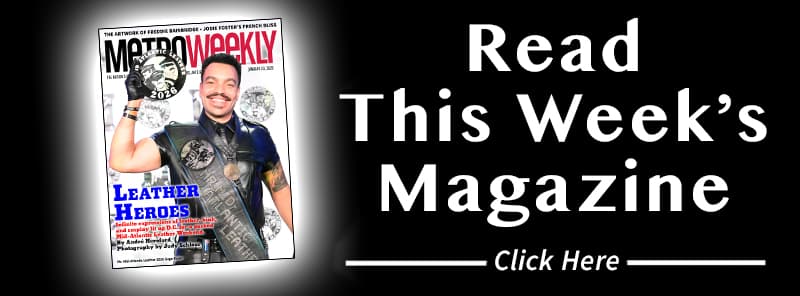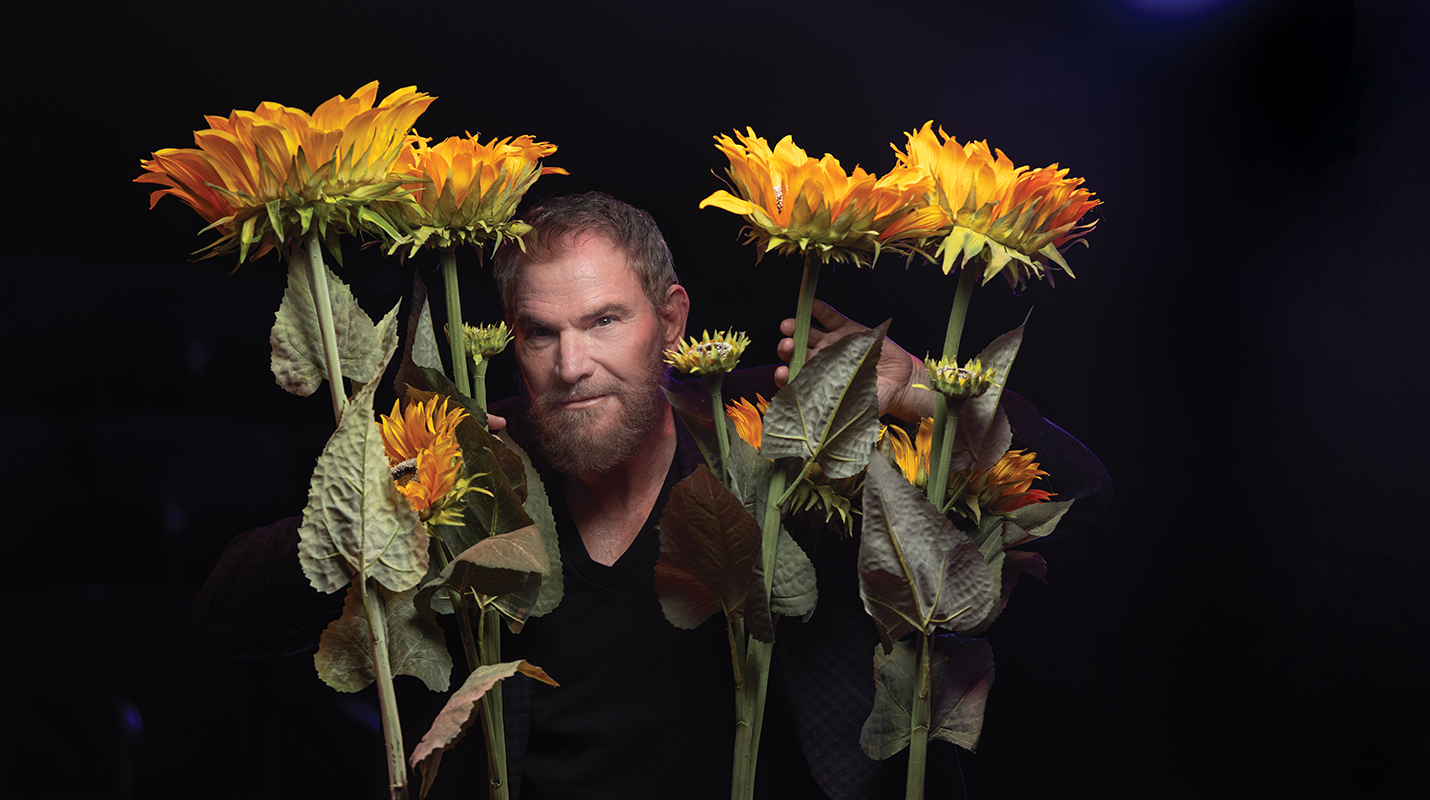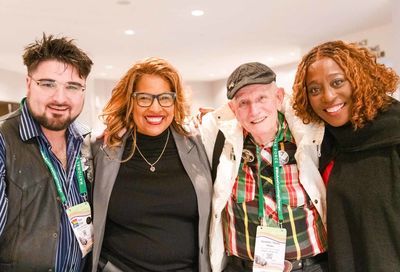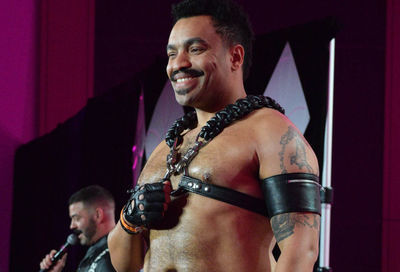Round House’s ‘Next to Normal’ is a Powerhouse (Review)
Tracy Lynn Olivera and Kevin S. McAllister scale the heights of blistering emotion in Round House's stellar "Next to Normal."
By André Hereford on February 6, 2024 @here4andre

Any and every one us in the audience for Alan Paul’s penetrating production of Next to Normal at Round House might know a woman like the show’s Diana Goodman. Maybe you’re related to her, or see her in the mirror.
You can see the truth of her embodied in the brilliant performance of Tracy Lynn Olivera, a D.C. theater treasure making her Round House debut as the suburban wife and mom struggling against grief, depression, and mental illness to find even some semblance of stability.
Soldiering by Diana’s side, and soaring alongside her through the Tony-winning score by composer Tom Kitt and lyricist Brian Yorkey, is her husband Dan, devoted yet often conflicted, portrayed by the equally esteemed Kevin S. McAllister.
So, Round House crowds are doubly blessed to see and hear such challenging roles essayed by those with the due talents, conviction, and gravity to send us scaling the raw, ragged mountains of emotion brought forth in Yorkey’s deftly plotted script.
Olivera and McAllister marry beautifully as onstage partners in Diana and Dan’s complicated, trying existence. Their bustling family dynamic, with teenage son Gabe (Lucas Hinds Babcock) and daughter Natalie (Sophia Early), is credibly set in the first number, “Just Another Day,” aided by effective intentional misdirection. They might seem like everything is “normal,” until the scene reveals Diana’s tenuous hold on reality.
Wilson Chin’s striking scenic design suggests that liminal space between reality and what’s happening in Diana’s head. In her tangible world, pill bottles spill to the floor, and doors slam with force. In “I Miss the Mountains,” she tries to toss out her meds and live with the peaks and valleys.
But in her thoughts, she’s haunted by pain she can’t process. Though Paul offers acute insight into her experience, employing a wall of video panels, featuring sometimes trippy projections designed by Nicholas Hussong.
The screens become a means of amplifying all the characters’ feelings, as well as the tension of Diana’s encounters with extreme medical intervention. The visual spectacle can distract from vital beats of song or dialogue, but the device adds a subtle tinge of horror that suits aspects of this probing portrait.
And throughout, Paul navigates the cast gracefully through delicate transitions from an average family’s quotidian rhythms into the dark, imaginary caverns of Diana’s struggles.
Diagnosed with bipolar disorder, her struggles reverberate through all their lives. Yet, she maintains a sense of humor, exemplified in the charmingly sardonic “My Psychopharmacologist and I.” As said psychopharmacologist, Calvin McCullough contributes his own deft comic timing to the number.
That song pairs with Dan’s more serious “Who’s Crazy,” with him contemplating his own struggles in this marriage, and McAllister beautifully relaying a spouse’s sense of duty and exhaustion. As their daughter, spiraling into her own chaos of drugs and confusion, Early captures Natalie’s justifiable defiance, alongside her deeply felt sadness.
The whole family’s understandably exhausted, while, paradoxically, the cast — including Ben Clark, who shines as Natalie’s amorous classmate Henry, in his “Hey” duets with Early — must tap into wells of stamina to put across Kitt and Yorkey’s challenging score and emotionally taxing narrative.
Probing universal truths about grief and depression via the very specific circumstances of one loving family, this Next to Normal pierces the heart, provokes vital conversation, and brings powerhouse performance and music to our ears.
Next to Normal (★★★★☆) runs through March 3 at Round House Theatre, 4545 East-West Highway, Bethesda, Md. Tickets are $46 to $88, with discount options available, including free tickets for students ages 13 through college, and 2-For-1 Tuesdays.
Call 240-644-1100, or visit www.roundhousetheatre.org.
More from Metro Weekly:
Lovell Holder Turns Reality TV Into a Queer Reckoning
His novel, The Book of Luke, blends queer romance, politics, and competition at a moment when LGBTQ readers are craving big, messy stories.
By André Hereford on January 12, 2026 @here4andre
Lovell Holder's debut novel, The Book of Luke, arrives at a precipitous moment for queer literary fiction. The heated tale of a handsome gay ex-athlete romancing a rival (or two) on a hit reality TV competition, the book seems custom-built to reach the ravenous audience that's turned the Heated Rivalry books and TV series into a phenomenon.
Of course, Holder, who's also a filmmaker, started writing The Book of Luke several years ago, with a different intention than riding the wave of a gay hockey hit.
Holder started the book, which chronicles the life and reality TV adventures of Luke Griffin, the soon-to-be ex-husband of a gay Republican U.S. Senator, in 2019. "I was really interested, at that time, in the idea of complicity and how underrepresented communities can sometimes oppress members of other underrepresented communities," he says.
Douglas Sills Finds Himself in Tevye
The Broadway veteran discusses reimagining Fiddler on the Roof at Signature Theatre, Jewish identity, and HBO’s The Gilded Age.
By Randy Shulman on January 17, 2026 @RandyShulman
Douglas Sills loves to laugh. It's a big laugh, hearty and life-affirming. And it -- along with a warm, impossibly broad smile -- blankets a conversation with him in warmth and comfort. The laugh bursts forth at unexpected moments, such as when the actor, known for stints on Broadway and as French chef (revealed to be a Kansas cook) Monsieur Baudin on HBO's The Gilded Age, is asked if he has ever been part of a play that's gone terribly wrong.
"I don't have a disaster in my head offhand," he grins. "Do I? I don't. Maybe it's because you go to work every day for months and you're pouring your heart and soul into it, you're there for hours and hours and hours and hours and hours, and you're giving up everything to do it, and it's not a high-paying thing. And so you drink the Kool-Aid -- you have to. And so maybe that's why it doesn't feel like a disaster to me." He pauses. "But I've seen some disasters."
Marjorie Prime Outmatches Chess on Broadway
Jordan Harrison’s quietly devastating play proves far more affecting than the musical revival of the long-troubled Chess.
By Ryan Leeds on January 4, 2026
In 2015, it all seemed to be a novel concept. That's the year Jordan Harrison's Pulitzer Prize-nominated Marjorie Prime premiered Off-Broadway. Certainly, artificial intelligence had been developed, but in the ten years since, its sophistication and abilities have reached levels that are both beneficial and ethically questionable. Now, the piece has returned, this time on Broadway.
The use of AI rests at the center of Harrison's drama about Marjorie (June Squibb), an octogenarian who lives with her daughter, Tess (Cynthia Nixon), and her son-in-law Jon (Danny Burstein). Christopher Lowell rounds out the cast as Walter, a computerized version of Marjorie's deceased husband, known as a "Prime." With short-term memory loss and slight dementia plaguing Marjorie, the robotic form of her late spouse reappears in his thirties and relays information provided to him by Jon and Tess.
Support Metro Weekly’s Journalism
These are challenging times for news organizations. And yet it’s crucial we stay active and provide vital resources and information to both our local readers and the world. So won’t you please take a moment and consider supporting Metro Weekly with a membership? For as little as $5 a month, you can help ensure Metro Weekly magazine and MetroWeekly.com remain free, viable resources as we provide the best, most diverse, culturally-resonant LGBTQ coverage in both the D.C. region and around the world. Memberships come with exclusive perks and discounts, your own personal digital delivery of each week’s magazine (and an archive), access to our Member's Lounge when it launches this fall, and exclusive members-only items like Metro Weekly Membership Mugs and Tote Bags! Check out all our membership levels here and please join us today!
The Magazine
-
Most Popular
 Tucson Pride Cancels 2026 Festival, Dissolves Board
Tucson Pride Cancels 2026 Festival, Dissolves Board  Trump Administration Moves to Deport Gay Couple to Iran
Trump Administration Moves to Deport Gay Couple to Iran  LGBTQ TikTok Influencer Beaten to Death in Thai Forest
LGBTQ TikTok Influencer Beaten to Death in Thai Forest  LGBTQ Lawmakers Condemn Killing of Alex Pretti by ICE
LGBTQ Lawmakers Condemn Killing of Alex Pretti by ICE  In A Private Life, Jodie Foster Shines as the Mystery Fades
In A Private Life, Jodie Foster Shines as the Mystery Fades  Tyra Announces Lawsuit Against RuPaul, Visage, and WOW
Tyra Announces Lawsuit Against RuPaul, Visage, and WOW  Gay Porn Star Austin Wolf Gets 19 Years for Child Sex Crimes
Gay Porn Star Austin Wolf Gets 19 Years for Child Sex Crimes  Capital Pride President Resigns Amid Investigation
Capital Pride President Resigns Amid Investigation  Alvin Ailey Finds a New D.C. Home at The Warner
Alvin Ailey Finds a New D.C. Home at The Warner  Anti-LGBTQ Incidents Spiked Nationwide in 2025
Anti-LGBTQ Incidents Spiked Nationwide in 2025
 Alvin Ailey Finds a New D.C. Home at The Warner
Alvin Ailey Finds a New D.C. Home at The Warner  Trump Administration Moves to Deport Gay Couple to Iran
Trump Administration Moves to Deport Gay Couple to Iran  In A Private Life, Jodie Foster Shines as the Mystery Fades
In A Private Life, Jodie Foster Shines as the Mystery Fades  Tyra Announces Lawsuit Against RuPaul, Visage, and WOW
Tyra Announces Lawsuit Against RuPaul, Visage, and WOW  Tucson Pride Cancels 2026 Festival, Dissolves Board
Tucson Pride Cancels 2026 Festival, Dissolves Board  LGBTQ TikTok Influencer Beaten to Death in Thai Forest
LGBTQ TikTok Influencer Beaten to Death in Thai Forest  Anti-LGBTQ Incidents Spiked Nationwide in 2025
Anti-LGBTQ Incidents Spiked Nationwide in 2025  Win Tickets to Bianca Del Rio
Win Tickets to Bianca Del Rio  Judge Rejects DOJ Effort to Charge Don Lemon
Judge Rejects DOJ Effort to Charge Don Lemon  LGBTQ Lawmakers Condemn Killing of Alex Pretti by ICE
LGBTQ Lawmakers Condemn Killing of Alex Pretti by ICE
Scene
Metro Weekly
Washington's LGBTQ Magazine
P.O. Box 11559
Washington, DC 20008 (202) 527-9624
About Us pageFollow Us:
· Facebook
· Twitter
· Flipboard
· YouTube
· Instagram
· RSS News | RSS SceneArchives
Copyright ©2025 Jansi LLC.














You must be logged in to post a comment.